
14 minute read
Intensive English
In order to gain full admission to the University of Memphis, international students must meet English language proficiency requirements. The Intensive English for Internationals (IEI) program puts students on the right track.
Though comprehensive and challenging, the IEI program provides international students everything they need to achieve English proficiency and pursue their academic goals. Students can apply for conditional admission to the University before or during their time in the program. The classes are small and structured to develop English communication and academic skills through speaking, listening, reading and writing.
IEI has three levels of instruction — basic, intermediate and advanced — and classes in reading and writing, grammar and communication skills. The eight-week IEI sessions begin in August, October, January, March and May. New students are tested at the beginning of each session and placed in one of the three levels accordingly. There are also opportunities for skills-based advancement within the program.
“When I came here, I didn’t know English at all,” said Laura Ximena Moreno Marin, an international student from Colombia.
“Now, a year later, I am so impressed with myself. As an international student, I think IEI is a great option. They can help you a lot. I love the University of Memphis because there are always people trying to help you.”
The highly academic nature of the IEI curriculum prepares students for entry into many graduate and undergraduate settings. The advanced-level courses are specifically designed to strengthen academic English skills by providing integrated language instruction and practice in the context of academic content study. Students earn recommendation to undergraduate or graduate study as they demonstrate mastery of higher-level academic English language skills as described in the Pearson Global Scale of English.
— Brandon Munoz, former IEI student from Honduras
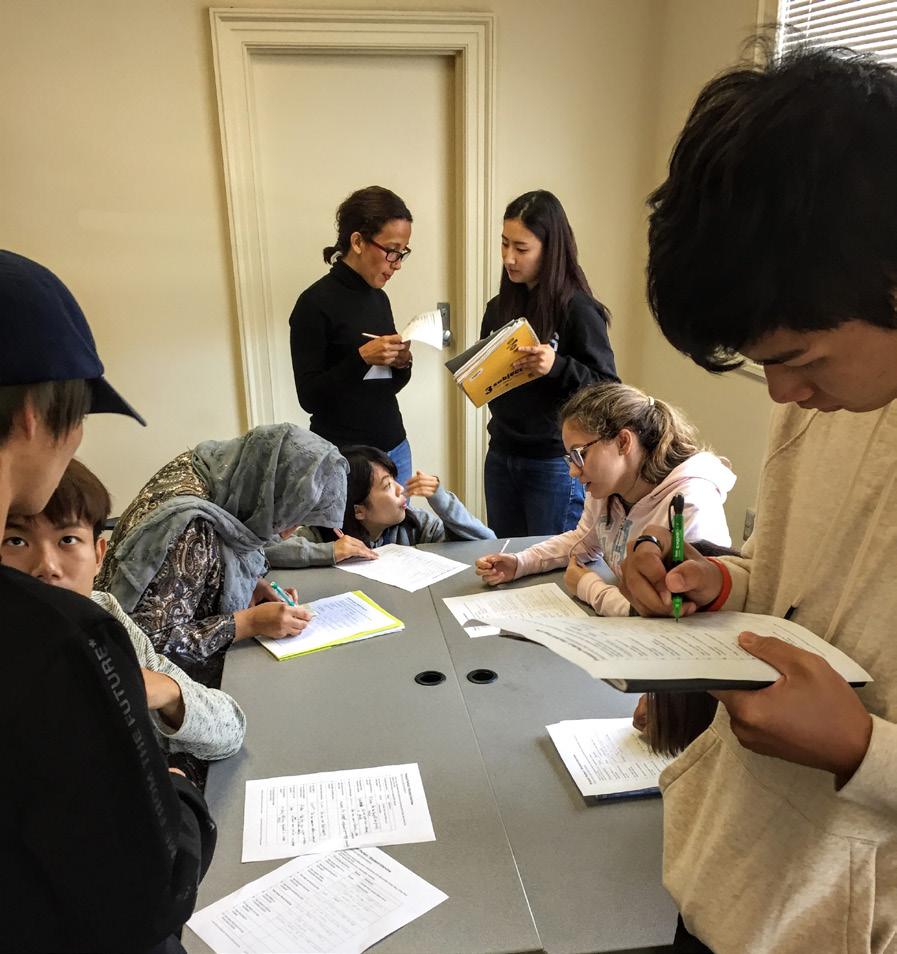
After becoming fully immersed in the UofM educational experience, students continually find help and guidance at the University and within the Memphis community.
“Our professors are really, really helpful,” said Bibata Abdoulaye Lawali, an international student from Niger.
“With English not being my first language, they are always here to help us understand. They have many alternative ways to help you understand the lectures. You don’t feel uncomfortable. Even though your English is not perfect, you don’t feel ashamed to talk because people are very tolerant in Memphis.”
Beyond providing the basis for obtaining a degree in the U.S., IEI also gives international students an opportunity to make friends and grow socially. IEI students can participate in weekly activities that include live music, dinner parties, holiday celebrations and game nights. They have access to all activities available to students on campus.
The Conversation Partners Program pairs IEI and UofM students in order to build friendships and encourage English conversations in a social
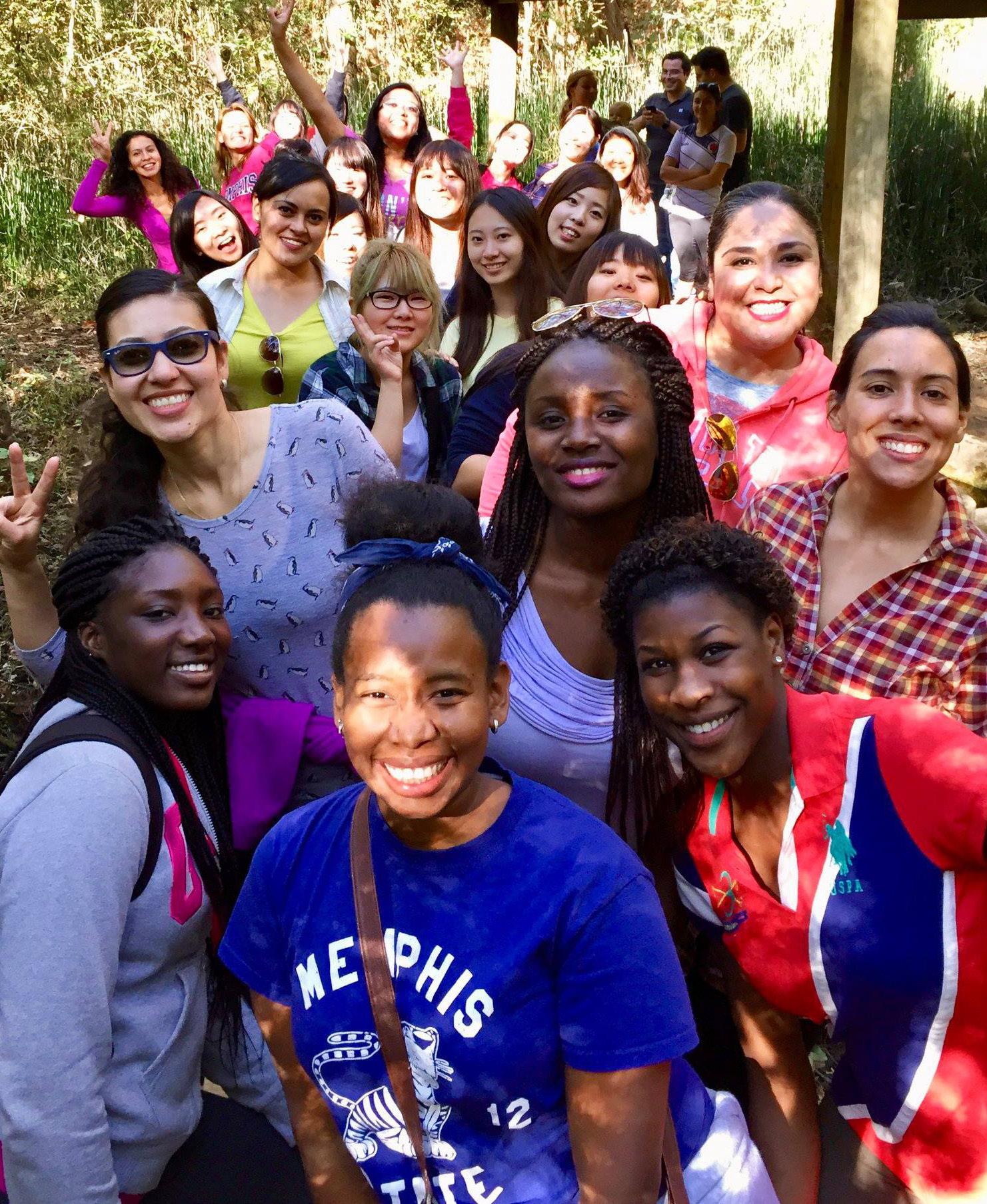
setting outside the classroom. The Friendship Families Program gives IEI students an invitation to visit homes in the Memphis area, further allowing students to gain comfort and confidence in their English abilities.
IEI has been a UofM program since the early 1980s. Over the past 15 years, students from 119 countries have studied in the program. Students in IEI have gone on to careers in medicine, education, business, engineering, counseling, religious work, journalism and more.
To learn more about IEI, visit memphis.edu/iei.
A Research Journey in Sicily
BY DR. KATHERINE LAMBERT-PENNINGTON
Director | School of Urban Affairs and Public Policy
WWHAT DO OLIVE OIL, PECORINO CHEESE AND PISTACHIOS HAVE IN COMMON WITH STUDY ABROAD? These products, and many more, are part of the rich agricultural tradition and cultural heritage of the Simeto River
Valley, which has served as the site of the Environmental Planning and Design study abroad class since 2013. Enhancing these traditions, as well as the environment and livelihood of residents in this region of Southern Italy on the island of Sicily, is the goal of our on-going collaboration with the Participatory Presidium, a local grassroots coalition.
Each year, University of Memphis students and faculty from Anthropology, City and Regional Planning and several other disciplines travel to the Simeto River Valley, an area tucked in the shadow of the Mount Etna volcano, to undertake community-based research to advance key elements of the Simeto River Agreement — an internationally recognized community development plan designed to support the ecologically sensitive, sustainable development practices. The focus of the class varies year-to-year based on a specific theme identified by the Presidium, such as mobility, water, waste, agriculture or urban regeneration.

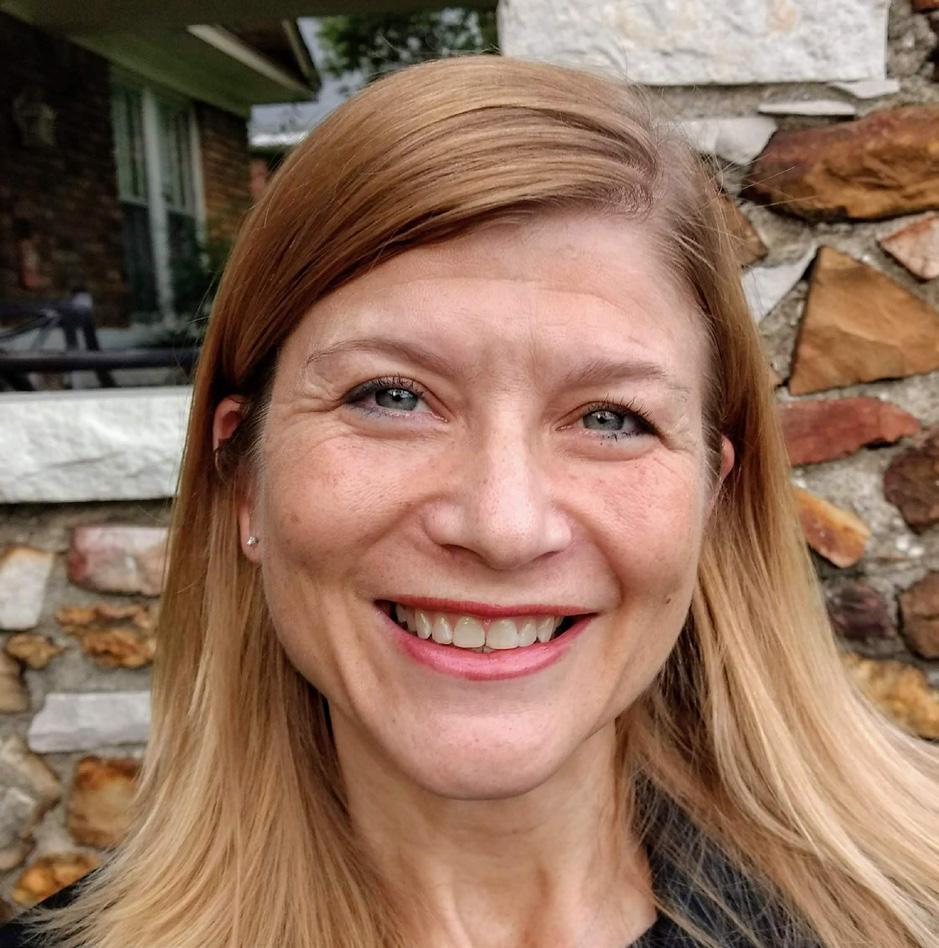
ABOUT THE AUTHOR
Katherine Lambert-Pennington is an associate professor in the Department of Anthropology and the director of the School of Urban Affairs and Public Policy. She is an engaged anthropologist whose research interests include citizenled community development, food justice, neighborhood inequality, alternative development, placebased identity construction and participatory action research. She has done research in South Africa, Australia, Italy and the United States. Since 2016, she has co-led the CoPED program and is currently working with the Participatory Presidium of the Simeto River on a long-term ethnographic project that examines the politics of development in Italy's Simeto Valley.
THE PARTICIPATORY LEARNING EXPERIENCE
Beginning in mid-spring, students meet for weekly lectures and discussions about the history and culture of the area, the ongoing work of the Participatory Presidium and the participatory research methods they will use while in the field. Using this knowledge, students identify examples of projects based on the chosen theme and research best practices they will share with the Simetine community.
In early June, we join forces with engineering and planning students from the University of Catania and University of Massachusetts Boston for an immersive 11-day hands-on learning experience in the Simeto Valley known as CoPED (Community Planning and Environmental Design). The combined group uses an action-learning methodology that is designed to maximize collaboration between students from different disciplines, and between students and the community.
The combined group uses an action-learning methodology that is designed to maximize collaboration between students from different disciplines, and between students and the community.
At a welcome dinner, members of the Presidium share what they hope to learn from the students’ work, and students present their research on similar projects. During the intense 12-hour days that follow, students travel throughout the valley and interact directly with farmers, mayors and other community leaders. Bilingual Italian students and faculty help overcome any language barriers, translating both words and cultural meanings.
Students meet with community members to hear about their experiences, tour organic farms and historical sites and attend cultural events to learn more about the people, culture and challenges in the region. Then, drawing on the methods learned in the classroom, students conduct surveys in the public square, perform interviews, map culturally important local sites and landscapes and pore over relevant statistical data related to the region, including employment, income, population and environmental change.
As students analyze the data, they hold brainstorming and whiteboard sessions to develop project ideas, and host community workshops to test their program recommendations. Gradually, students transform their new knowledge into points of an action plan for the project.
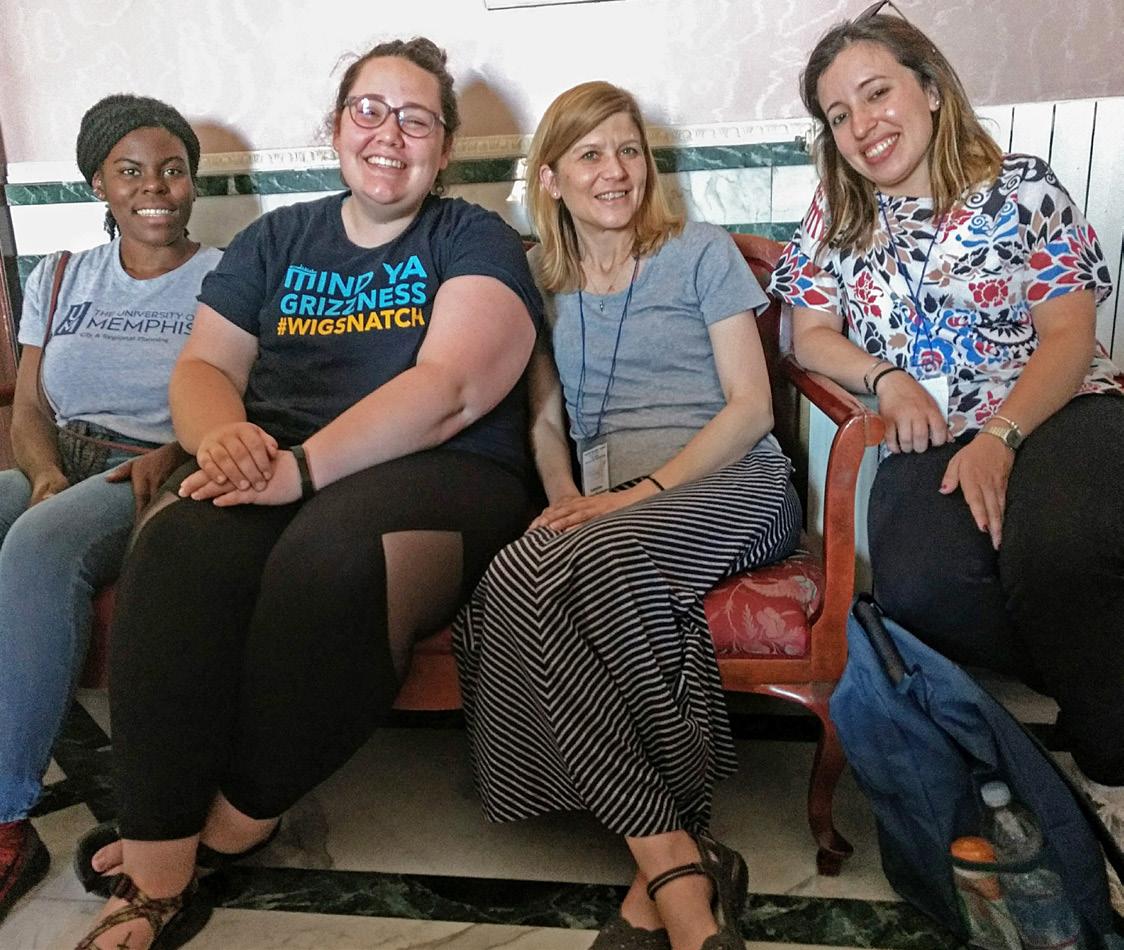

At a final community meeting, students present the project ideas they have developed to local mayors and citizens, allowing the community the opportunity to ask questions, debate the fine points and make suggestions. Students spend the last days of the class finalizing the project recommendations and writing a report that brings together the findings from the research, specifies a rationale for the project and describes key steps to help the community move from proposal to action.
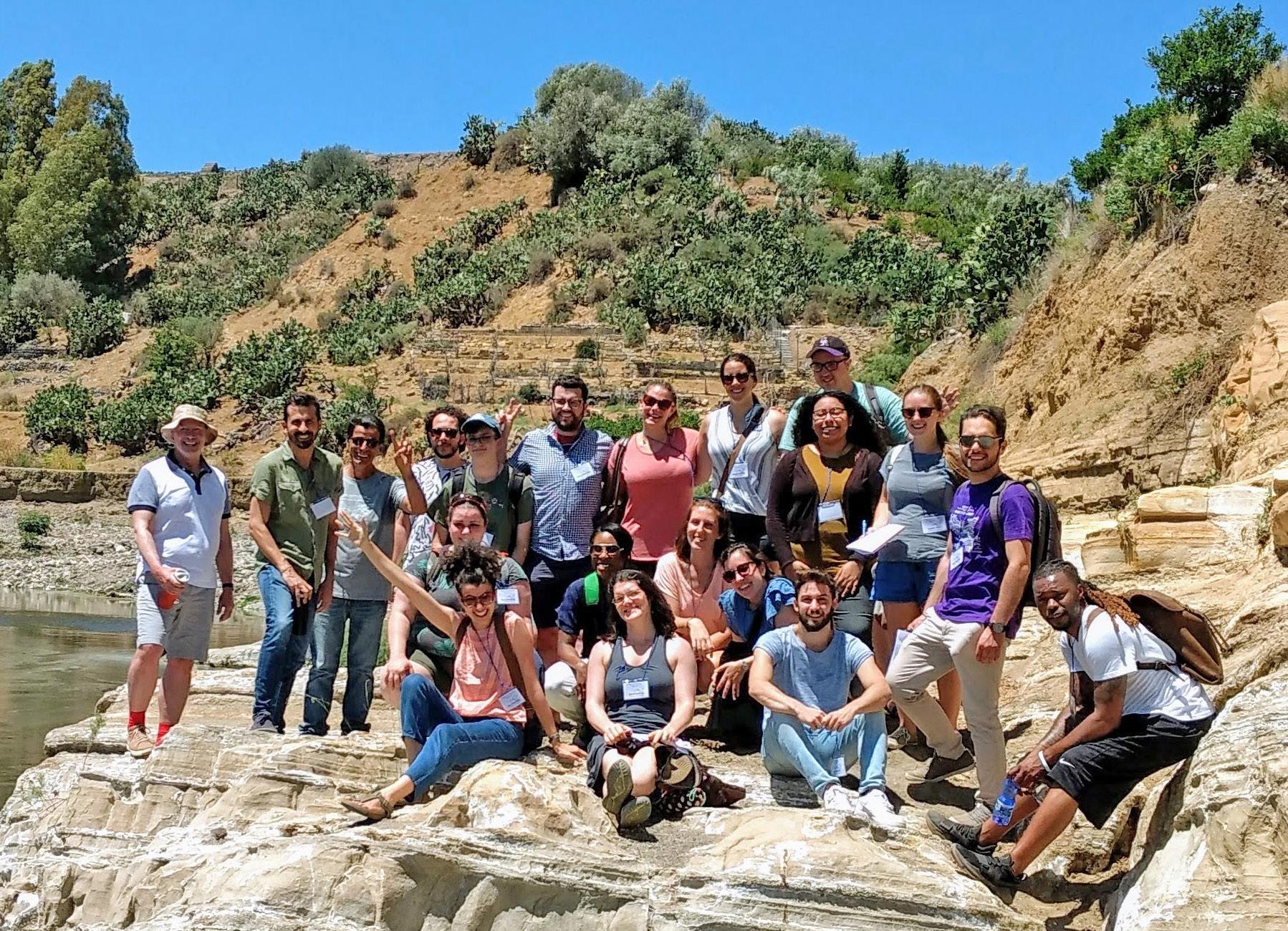
In true Sicilian style, the class ends with a farewell celebration hosted by the Presidium. The annual ritual provides participants – students, faculty and community members – the opportunity to reflect on their work together, express their thanks and spend time with new friends and colleagues. For the Presidium, this marks the beginning of a new phase of work as they begin to use the data, refine the ideas and apply for grant funding that will allow them to implement the collaboratively developed projects.
LEARNING THAT MAKES A DIFFERENCE
Being part of this study abroad program is transformational for both University students and faculty, as well as for the community. Through our collaboration with the Presidium, students have conducted research that has enabled the community to reimagine an old train station as the hub of a rails-to-trails project featuring local agriculture and art. Their work has also assisted municipalities and community groups
in adopting zero-waste and waste prevention strategies, and co-created a cultural heritage project that connected the water, land and agricultural traditions of the region.
Being able to utilize the knowledge they acquired in the classroom and apply it to real-world situations has provided students a unique opportunity to improve and retain skills they use long after they return to Memphis.
“Before I went on the trip to Sicily, I took a class called Anthropological Methods, which taught me the necessary interview skills and how to properly learn from what the interviewee told me,” said Kevin Murphy (Anthropology, BA ’17). “Ultimately, this course introduced me to the field of city and regional planning, and it is one of the main reasons I decided to pursue a career in planning, which I am now studying in graduate school.”
Suzie Marshall, a graduate student studying both anthropology and city and regional planning, was skeptical of community-based development before her study abroad experience.
“I didn’t think that there could be true change to issues like environmental well-being from the bottom up,” she said. “However, in Sicily I got to see communities build up their own infrastructure that shifts toward a zero-waste system in a way I didn’t believe possible. It was extraordinary.”
Gretchen Pederson (Anthropology, BA ’20), said that the course provided her with a more meaningful understanding of anthropology, community and change.
“I have often viewed methodology as mundane and overwhelming, yet this experience helped me to develop a genuine appreciation for research design and its application in the field,” she said. “My time in Sicily contributed significantly to my growth as a human being and anthropologist, teaching me the importance of community, solidarity and the impact of research advocacy.”
Alysia Shear (Earth Sciences and Anthropology, BA ’19) discovered that she was able to use these new skills in collaboration with others and put into practice ideas about research and theories.
“The Sicily trip was especially transformative for me as it led to many new self-discoveries,” Shear said. “It was academically influential, giving me the opportunity to serve as a team member on a community project and making me apply my academic learning in anthropology to the real world and see the reactions to it.”
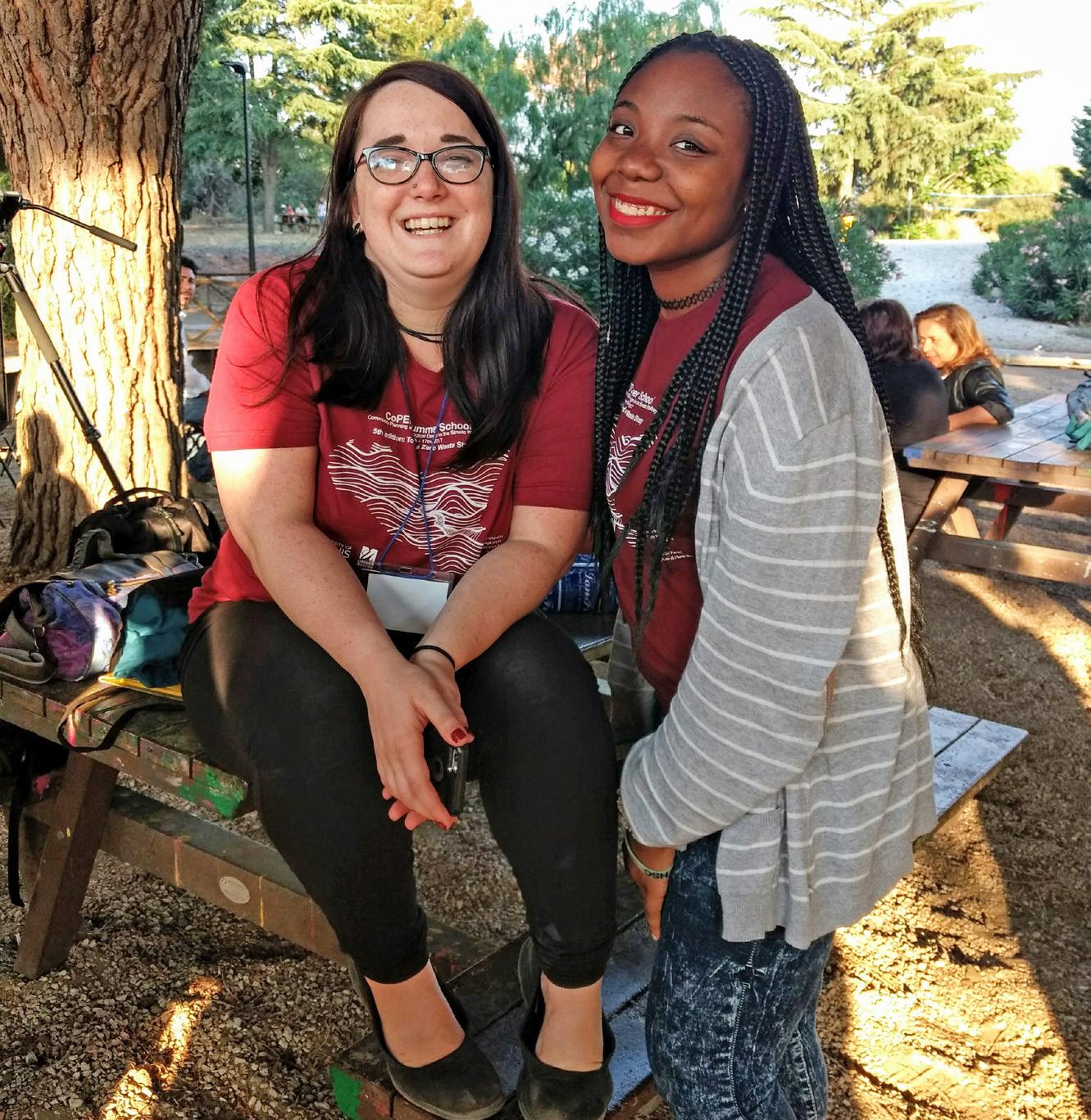
Want to see the Environmental Planning and Design study abroad class in action? Check out the videos from CoPED at
https://youtu.be/qaeH0ItIaX4
Alumni Spotlight: GIAN GOZUM

Cordilleras mountain range
Gian Gozum’s (BA ’12) experience at the University of Memphis set him on the path to his current job as a foreign service officer for the U.S. Department of State. As a student, he extensively used the resources provided through the UofM’s Study Abroad Office to see the world and expand his knowledge of different cultures. He has gained educational and professional experiences in China, Indonesia, the Philippines and India, and is currently learning his fifth language.
Gozum grew up in Jackson, Tenn., after relocating with his family from the Philippines. In addition to English, he regularly spoke Tagalog — the language of the Philippines — as a child. He learned Mandarin Chinese as an undergraduate at the UofM while completing bachelor’s degrees in Economics and Asian Studies and International Trade. Since leaving the UofM, Gozum has learned Indonesian and is currently studying Spanish as part of his role with the Department of State.
As an undergraduate, he was a recipient of the Emerging Leaders Scholarship Program and a member of the Helen Hardin Honors College. Gozum credits both programs for helping reinforce his commitment to public service and exposing him to different, often competing, ways of thought.
In November, he is scheduled for a move to Tegucigalpa, Honduras, to begin his first diplomatic tour in his new position.

State Department Lobby Hiking through Cordilleras mountain range and rice terraces in Sagada, Philippines
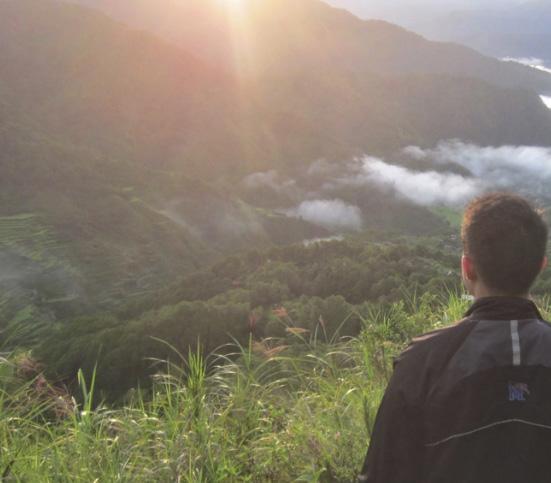
Q: What do you do in your current job?
Gozum: Foreign service officers have a variety of roles, but my career track is focused on improving the United States’ economic relations with its foreign counterparts.
As an entry-level officer during my first tour of duty in Honduras, I’ll spend the first year with the embassy’s consular services and American Citizens Services (ACS) department. I will assist American citizens residing in Honduras and interview Hondurans who want to visit or immigrate to the U.S.
The State Department is often the first line of defense through the proper adjudication and conduction of these interviews, and I am excited to be a part of the team. Recently, ACS teams across the world have repatriated Americans back to the United States during the coronavirus pandemic.
During my second year, I will work with the embassy’s economics teams to promote American business interests, prepare economic analyses and recommend strategies for the implementation of American policies. I will also help American companies conduct business in Honduras.
Q: Why did you pursue this career path?
Gozum: I always loved learning about other cultures and learning languages in the process. With the State Department, I have a unique opportunity to combine my love of travel and learning with the chance to make a difference as a public servant.
Q: In what ways did the UofM help you launch your career?
Gozum:
I was a high school senior in 2007 when I was accepted into the Governor’s School for International Studies (GSIS) at the UofM. I knew back then I was interested in foreign cultures and foreign languages, but I had no idea that there was a specific set of studies and even careers that would leverage such knowledge. At the GSIS summer program, I took college-level courses in economics, international relations and Mandarin Chinese. After that experience, I knew that I wanted to study these topics in college, which led me back to the UofM as an undergraduate.
Early in my time at the University, I joined the thennew Confucius Institute for a three-week immersion program in China. It was my first of many times working with the Study Abroad Office while at the UofM.
I later took part in a history course on genocide and the Holocaust with corresponding site visits in Germany, Poland and the Czech Republic. Another history course on the Trans-Atlantic Slave Trade and its impact on the culture of Brazil led me on a trip to Salvador, Brazil. Both of these study experiences — led by Dr. Dennis Laumann — were some of the most influential moments of my undergraduate career. Additionally, I took part in a twomonth program of business coursework in Ingolstadt, Germany, and a four-month program in Shanghai, China.
State Department Ethos
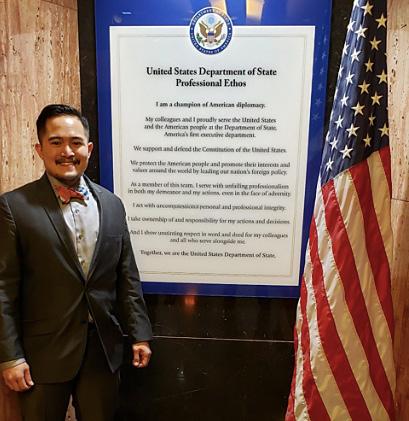
The UofM provided me with so many opportunities that developed my leadership skills and expanded my worldview. My current career path would not be possible without the experiences and knowledge that I first gained at the University of Memphis.
Q: What are your long-term career goals?
Gozum: Becoming a foreign service officer has been my dream job. My previous jobs were in business intelligence and management consulting. While I learned much in these careers, I was always drawn to public service, and I am excited for the next chapter in Honduras! My previous studies were focused on Asia, and I hope to go back for my next tour.





